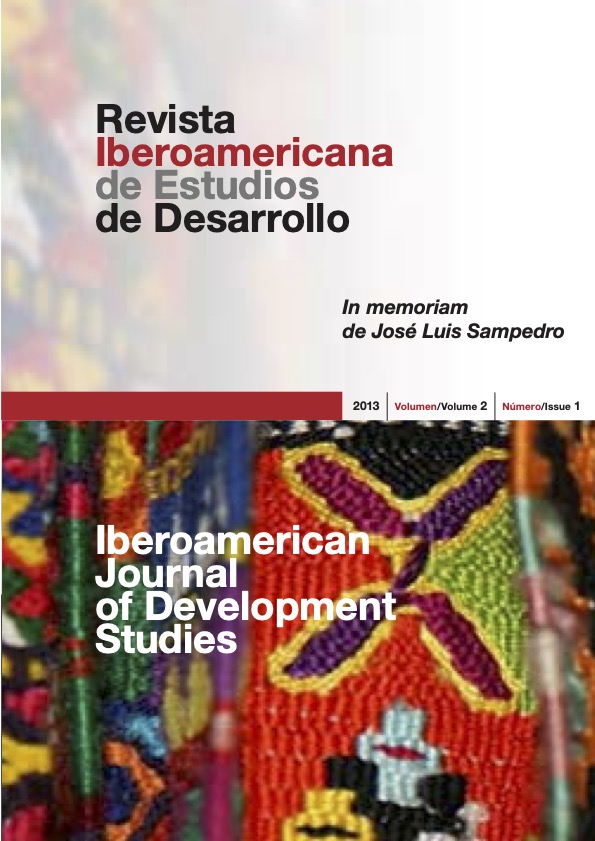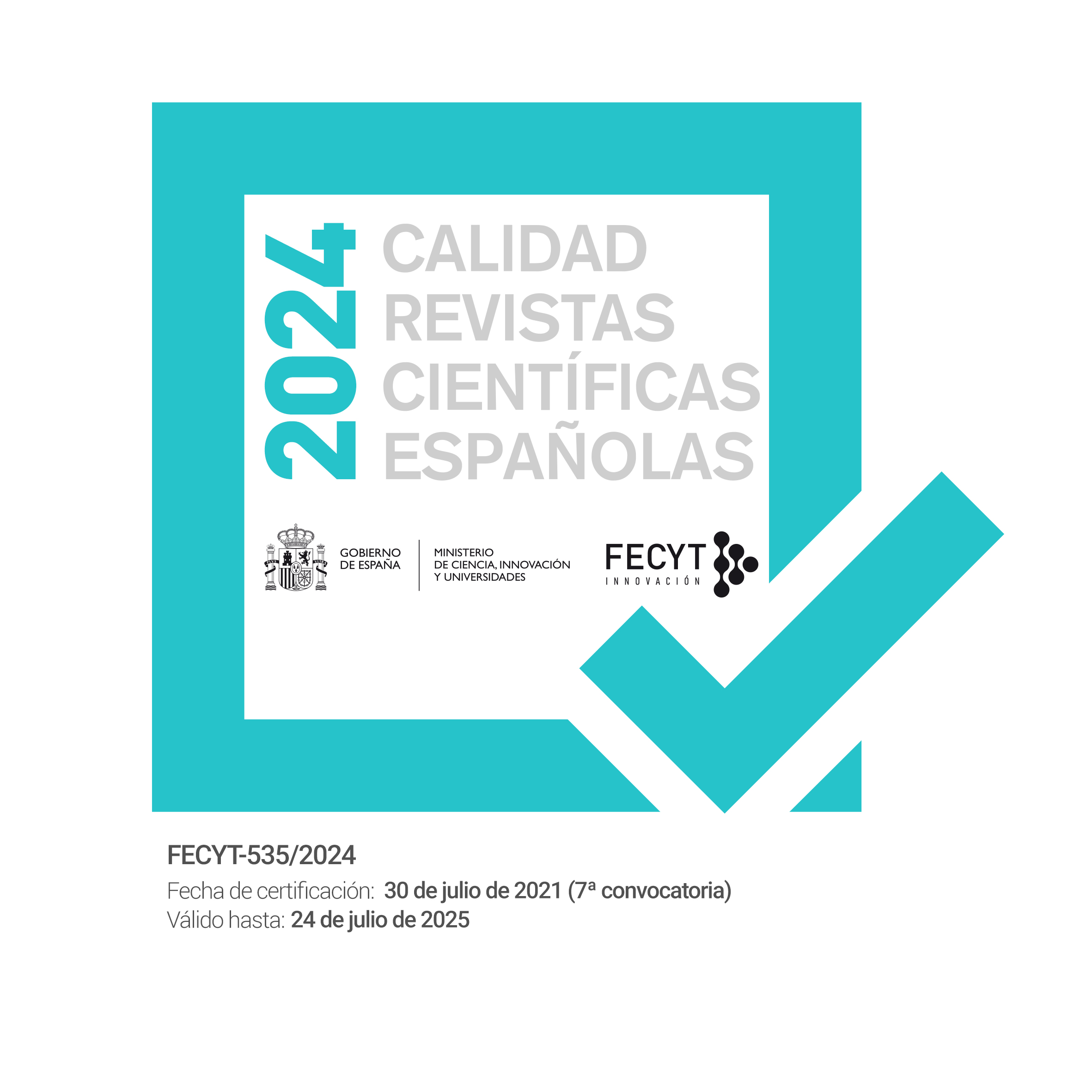Metodologías para la evaluación del impacto en desarrollo de la ayuda reembolsable: la experiencia europea
DOI:
https://doi.org/10.26754/ojs_ried/ijds.67Palabras clave:
impacto en desarrollo, evaluación del desarrollo, ayuda reembolsable, Instituciones de Financiación del DesarrolloResumen
En este artículo se analizan las metodologías de evaluación del impacto en desarrollo de las operaciones financieras aplicadas por las principales instituciones bilaterales europeas de financiación del desarrollo (IEFD). Para ello, se identifican los criterios de selección de los proyectos financiados utilizando tanto una revisión de la literatura disponible (incluyendo sus propias páginas web) como entrevistas realizadas en las propias instituciones. El artículo concluye que las metodologías aplicadas por estas instituciones contienen limitaciones severas en la medida en que no incluyen un análisis del marco institucional en el que se desenvuelven dichas operaciones, razón por la que el impacto en desarrollo atribuido debe ponerse en entredicho.
CITAR COMO:
Buendía, L. (2013). Metodologías para la evaluación del impacto en desarrollo de la ayuda reembolsable: la experiencia europea. Iberoamerican Journal of Development Studies, 2 (1): 94-117
Descargas
Citas
BRACKING S (2009). Money and power: great predators in the political economy of development. Pluto, London
BRACKING S, GANHO AS (2011). Investing in Private Sector Development: What are the Returns? Norwegian Church Aid, Oslo
CDC GROUP (2011a). CDC high level business plan 2011-2015. CDC, London.
CDC GROUP (2011b). Evaluation methodology. CDC, London
CONGDE (2012). La Ayuda Oficial al Desarrollo podría descender a niveles de 1981 [nota de prensa]. http://www.congde.org/index.php/noticias/vernoticia/id_noticia/1745 , accesed 15 January 2013
CORNER HOUSE, OLOKO D. (2010). DFID in 209-10 and the Resource Accounts 2009-10, UK Parliament, London. http://www.publications.parliament.uk/pa/cm201011/cmselect/cmintdev/writev/dfid/m8.htm , accessed 20 November 2012
DALBERG GLOBAL DEVELOPMENT ADVISORS (2009). The Growing Role of the Development Finance Institutions in International Development Policy. Dalberg Global Development Advisors, Copenhagen
DALBERG GLOBAL DEVELOPMENT ADVISORS (2011). The Growing Role of the Development Finance Institutions in International Development Policy, 2nd ed. Dalberg Global Development Advisors, Copenhagen
DEPARTMENT FOR INTERNATIONAL DEVELOPMENT (DFID) (2011). The Engine of Development: The private sector and prosperity for poor people. DFID, London
DOLLAR D, KRAAY A (2002). Growth is Good for the Poor. Journal of economic growth 7 (3):195-225.
EUROPEAN DEVELOPMENT FINANCE INSTITUTIONS (EDFI) (2011). Annual Report 2010. EDFI, Brussels
FITZGERALD V (2007). Desarrollo financiero y crecimiento económico: una visión crítica. Principios: estudios de economía política 7:5-30
FMO (2011). Annual Report 2009. FMO, The Hague
GÖSSINGER A, RAZA W (2011). Bilateral Development Finance Institutions in Europe. A Comparative Analysis of DEG, CDC, FMO and Norfund with Recommendations for Development Policy, Working Paper, 29. Österreichische Forschungsstiftung für Internationale Entwicklung (ÖFSE), Viena. http://öfse.at/Downloads/publikationen/WP29_Finance_Institutions.pdf , accessed 20 November 2012
INTERNATIONAL FINANCE CORPORATION (IFC) (2011). International Finance Institutions and Development Through the Private Sector. IFC, Washington. http:// www.developmentandtheprivatesector.org/, accessed 20 November 2012.
KINGOMBE C, MASSA I, TE VELDE D (2011). Comparing Development Finance Institutions. Literature review. Overseas Development Institute, London
KRAAY A (2006). When is growth pro-poor? Evidence from a panel of countries. Journal of development economics 80(1):198-227
LATOUCHE S (1993). El Planeta de los náufragos: ensayo sobre el posdesarrollo. Acento, Madrid
MACÍAS VÁZQUEZ A (2012). La cooperación financiera en la ayuda multilateral de la política española de cooperación al desarrollo, Memorando OPEX, 166/2012. Fundación Alternativas, Madrid
OLIVIÉ I, PÉREZ A, MACÍAS CM (2012). Inversión local, cooperación financiera y desarrollo: reflexiones sobre el FONPRODE, Documento de Trabajo, 04/2012. Real Instituto Elcano, Madrid
ORGANISATION FOR ECONOMIC CO-OPERATION AND DEVELOPMENT (OECD) (2004). Accelerating Pro-Poor Growth through Support for Private Sector Development. OECD, Paris
ORGANISATION FOR ECONOMIC CO-OPERATION AND DEVELOPMENT (OECD) (2006). Promoting Pro-Poor Growth. Private Sector Development. OECD, Paris
SAAD-FILHO A (2007). Life beyond the Washington Consensus: an introduction to pro-poor macroeconomic policies. Review of political economy 19(4):513-537 SINHA S, BORTES C, GRETTVE A (2011). Literature review of development returns to DFIs investment in private enterprises. Nathan Associates, London
TE VELDE D (2011). The role of development finance institutions in tackling global challenges, Research reports and studies. Overseas Development Institute, London
WILLIAMSON J (1990). What Washington means by policy reform. In: J. Williamson (ed.), Latin American adjustment: how much has happened. Institute for International Economics, Washington, 7-20
Descargas
Publicado
Cómo citar
Número
Sección
Licencia
Derechos de autor 2013 Luis Buendía

Esta obra está bajo una licencia internacional Creative Commons Atribución-NoComercial-SinDerivadas 4.0.






